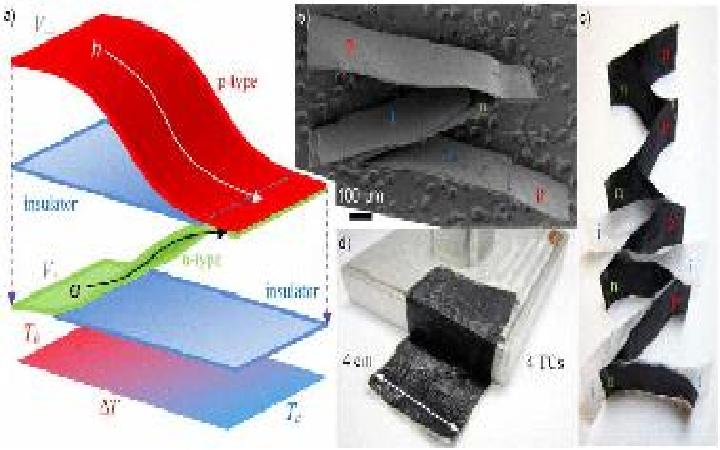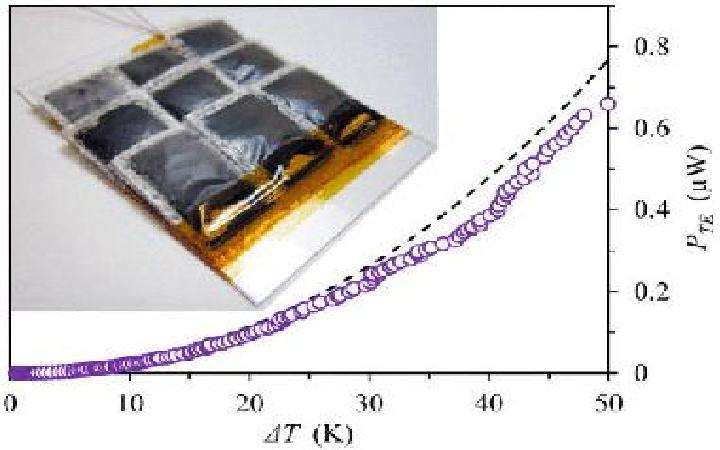The thermoelectric power produced by carbon nanotubes can be increased by simply doping the materials. This new result from researchers at Wake Forest University in the US could be important for making "smart fabrics".

Thermoelectric compositeThermoelectric materials convert heat directly into electricity and are thus good candidates for reducing global energy consumption. As well as possibly finding their way into cars, they could also be used to recover useful energy from waste heat produced in nuclear reactors and even improve the effectiveness of solar cells. They could also be used to cool computer chips and other electronic devices.
To be used in real-world applications, however, a thermoelectric must be good at conducting electricity but poor at conducting heat. It must also have a large thermopower (or "Seebeck coefficient"), which is the ratio of the voltage to temperature difference across a material to its temperature difference.
Increasing the power output
Carbon nanotubes (CNTs) could make good thermoelectric materials, but until now, they lacked the required thermopower characteristics. A team led by David Carroll has now shown that p- and n-doping the nanotubes can increase the power output to nearly 15 nW per a thermocouple at a maximum temperature difference of 50 K. This value is 44 times higher than the power output previously reported per a thermocouple for these carbon materials and corresponds to a single thermocouple Seebeck coefficient of 96±4 µVK−1 (which is more than six times higher than that previously reported).
Carroll and colleagues made p- and n-type carbon nanotube-based composites from a non-active host polymer (PVDF) and nanophase CNTs. The differently doped tubes combine to form a thermocouple in the finished device.

The device"Our p-type nanotubes are doped with oxygen (they have been exposed to air) and the n-type ones are tubes coated with polyethylenimine," Carroll told nanotechweb.org. "As it happens, the n-type material is the key here because it is rather difficult to synthesize an n-type nanotube with a large negative thermopower that does not have a decreased conductivity. (You need both a large negative Seebeck coefficient and a high conductivity for good power output.)"
Ultimately, these thermoelectric power output improvements mean that CNT-based composites could be used to make lightweight, flexible and durable thermoelectric fabrics for use in low-power electronics applications that harness waste heat, he added. "We are already working on making such textiles and the idea would be to engineer a fabric-like covering to replace those already used in day-to-day life. One example is a covering for car seats, for instance."
Power-generating covering
"If such a covering could be made at a similar cost to ones already available, then why wouldn’t you use it? The argument is a simple economic one – you get the same covering you would have normally used but it would be able to generate power."
The researchers say that they are continuing to increase the power density of their carbon nanotube-based composites. "We are also busy trying to make large area coverings," explained Carroll. "Indeed, we already have several pieces that measure 5 x 5 cm."
The team adds that it is trying to integrate both thermal and kinetic energy scavengers into a single platform too – and that platform looks like a fabric covering, said Carroll.
"Incidentally, I did forget one of our samples in a trouser pocket, and it went through a wash and dry cycle in the machine with no measurable deterioration in power output," he added. "So, it looks like these composites are quite robust, which is good news as well."
About the author
Belle Dumé is contributing editor to nanotechweb.org


